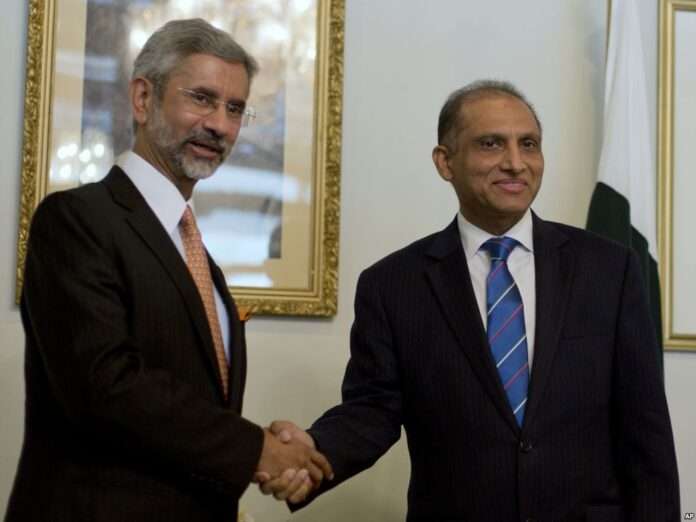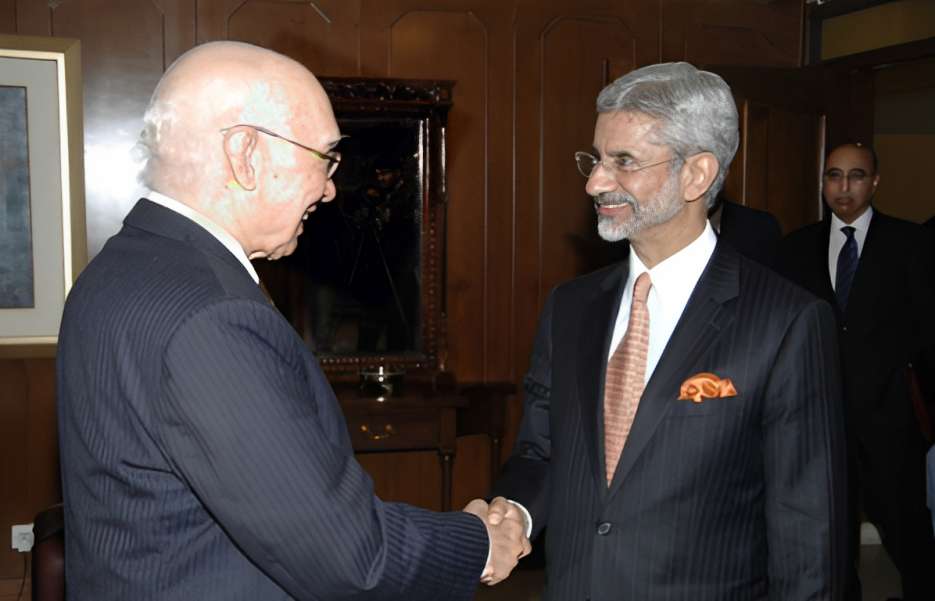
Following the resumption of foreign secretary level talks between India and Pakistan, the Foreign Secretary of Pakistan briefed the ambassadors of P-5 countries and the EU Mission, stationed in Islamabad, regarding the visit of Indian Foreign Secretary. India had characterized it as a visit in the context of SAARC; Pakistan portrayed it as a visit taking place in lieu of the August visit and termed it as an ice breaker. India ticked off an item to ward off international pressure; Pakistan’s conduct symbolized a wholesome engagement. Despite varied perceptions, the meeting was held in a constructive and positive atmosphere; no fireworks were reported, both sides restated their positions on various contentious events. Pakistani side was careful in not declaring the visit a failure and called it as part of a process. However, Advisor to Prime Minister on Foreign Affairs and National Security has acknowledged that there was no breakthrough during the talks.
The menace of terrorism is a known problem that affects most countries of the world including this region. Pakistan also has its concerns on this issue, these were elaborately articulated during the talks, especially the persistent Indian involvement that ferments terrorism in Pakistan, more so in FATA and Balochistan. While India talked about trial of those allegedly involved in Mumbai attacks, Pakistan reminded India that investigations about bombing of Samjhota express that took place much earlier than Mumbai attacks has not ended-up anywhere close to conclusion and that those who have made self-incriminating confessions are out on bail. Pakistan has suffered the most because of terrorism; and has done more than any other country to counter terrorism. Pakistan expects similar approach from other countries. As regards blaming Pakistan, it is not a good approach to blame every terrorist attack on Pakistan right on the onset of the event. Pakistan expects that thorough investigations should be conducted before any finger pointing. Blowing off of a smugglers’ boat by Indian coast guards in December 2014 is the latest example the way India jumps the gun.
Another important issue between the two countries is the right of self-determination by the people of Jammu and Kashmir who are larger in number than 123 currently independent nations and have a defined historical identity. They are, at present, engaged in a massive, indigenous and non violent struggle to win their freedom from the foreign occupation of their land. The relevance of the principle of self-determination to the specific case of Jammu and Kashmir has been, time and again, recognized by the United Nations. It was upheld equally by India and Pakistan when the Kashmir dispute was brought before the UN Security Council by India. The two countries entered into an agreement to allow the people of Jammu and Kashmir to exercise their right of self-determination under impartial auspices and in conditions free from coercion from either side.
Envoys from India and Pakistan agreed to “narrow differences” and find common ground, both Jaishankar and Aizaz Chaudhry stressed the need to work together but there was no decision on whether the meeting would result in future negotiations. The Indian Foreign Secretary’s two-day visit marked the first high-level meeting between India and Pakistan since talks were disrupted by India last year. “We engaged on each other’s concerns and interests in an open manner. We agreed to work together to find common ground and narrow differences,” Jaishankar said. “The overall tone of the meeting was positive…We need to make a concerted effort to resolve this dispute,” he said.
Jaishankar said that Pakistan will be the next Chairman of the SAARC and India wants to see the forum as successful. He also met the Pakistani Prime Minister and delivered a letter from Prime Minister Narendra Modi but both sides were tight-lipped about the contents of Modi’s letter, sources said it focused on the need to rebuild peaceful, friendly ties between the two nations by removing trust deficit. Prime Minister Nawaz Sharif said in a statement that both countries need to start a new chapter in their relationship.
The visit of the senior Indian diplomat is seen in Pakistan as a move to revive the stalled “Composite Dialogue” process between the two neighbours. India is also hoping to revive regular contacts between the border security forces on both sides to ensure peace on the border. A BSF-Pak Rangers consultation mechanism may be restarted, as well as other conversations. “We agreed that ensuring peace and tranquillity on the border was vital,” Jaishankar said. “Pakistan also sought to keep the focus on Kashmir in the talks.”

India wants to replicate the China border template with Pakistan. That is, intensify interactions between security forces and even DGMOs that would bring in a more peaceful border. The firing on the border, the Indian government has concluded, is proving to be a big hindrance to normalizing bilateral ties, and that 2003 ceasefire arrangement has been one of the biggest confidence building measures in operation. This ceasefire has unravelled since early 2013 with regular provocative firing by India, extending from the LOC to the international boundary. One of the first things that India wants to restore could be cross-LOC CBMs and agree to opening up more roads like the Kargil-Skardu, more border trade and more popular contacts. With a BJP-PDP government in operation in Jammu & Kashmir, there is greater incentive for India now to quieten the border.
A second message Jaishankar took with him to Pakistan concerned SAARC, which is a personal imperative of the Modi. “I conveyed the expectations of our leadership on SAARC and their determination to forge a cooperative relationship with all our neighbours. We discussed ideas and initiatives to take SAARC forward. Pakistan will be the next SAARC Chair and India would like to work with Pakistan to help SAARC achieve its potential.” India has conveyed to Pakistan that connectivity and trade would be implemented in the SAARC region, even if Pakistan chose to stay away. India is pushing the Bangladesh-Bhutan-India-Nepal (BBIN) sub-grouping to clear hurdles to connectivity between these four countries to pressurise Pakistan. Modi will make the pledges during a visit to Sri Lanka, Mauritius and Seychelles. New Delhi is hoping to tie the islands into a closer security embrace. “India has a role as a net security provider in the Indian Ocean region,” said a defence official involved in preparations for Modi’s trip. Modi is expected to tighten defence and security cooperation and push for final approval for a 500 MW power plant to be built by India’s state-run National Thermal Power Corporation and a strategic port in eastern Sri Lanka.
Back home Prime Minister Narendra Modi disapproved of Jammu and Kashmir chief minister Mufti Mohammad Saeed’s statement that Pakistan, Hurriyat and militants created a conducive atmosphere for elections in the state. Differences between the alliance partners burst out in the open after a group of PDP MLAs demanded the Centre hand over the remains of Parliament attack convict Afzal Guru to his family. Modi is well on its way for two-pronged strategy to squeeze Pakistan. He wants to bypass Pakistan within SAARC and create conditions that Pakistan softens its stance on Kashmir. Under these circumstances Pakistan should be in no hurry to talk to India. Pakistan should wait for the right kind of strategic environment, and that may happen when Modi mellows down his over ambitious regional and global objectives. This could happen when he is well into the second half of his tenure and issues arising out of his ongoing erratic regional policy begin to haunt him.




